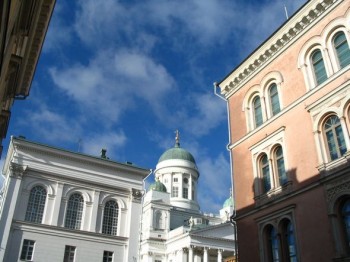Best in show
30 June 2011 | This 'n' that

Cooler than we thought: Helsinki. Photo: Leena Lahti
So Helsinki has just come out top in Monocle magazine’s Quality of Life survey.
Monocle, which takes a determinedly internationalist and unfailingly style-conscious view of politics, business, culture and design, was founded by its editor Tyler Brûlé in 2007. As anyone who follows his weekly column in the Financial Times will know, Brûlé leads a peripatetic life that will have given him personal experience of most, if not all, of the 25 cities under Monocle’s lens in this survey.
Monocle’s preferences, as the top three cities on the list indicate – Helsinki is followed by Zurich and Copenhagen – is for small, well organised, forward-looking cities. Oh, and ones with good water pressure – his home town of London, which might otherwise have featured higher on the list, was debarred by its Victorian water system, which rules out the cheering experience of an energising shower before work in the morning.
So, on a list clearly based on the minutest of scrutiny, just what is it that makes life in Helsinki so different, so appealing?
According to the criteria used, ‘the world’s most liveable city’ boasts a low crime rate, good school system, excellent public transport and low unemployment – but where Helsinki really stands out, for Monocle, is in its continuous implementation of intelligent urban planning (large docklands in the city centre have been demolished, for example, and replaced by desirable new housing areas) and its dynamic, can-do, approach to doing business.
Oh, and the eating and food culture in the city is flourishing, as the ‘New Nordic Cuisine’ rules. And, Monocle being Monocle, the sheer physical beauty of the city will have played its part in earning it its accolade. More details are to be found in the current, July-August, issue of Monocle.
Much of this is certainly true. From a resident’s point of view, Helsinki’s street culture has been transformed in the past fifteen to twenty years. The transportation system is a delight, although one that Helsinki people tend to take for granted, with clean buses, trains and trams running, broadly speaking, on time, as is the education system, with the state providing excellent schools to the extent that private-sector education is practically non-existent.
As for what the ‘New Nordic Cuisine’ is exactly, this remains slightly elusive to your editors here at Books from Finland, although it clearly has to do with well-sourced, locally grown food and simple flavours. We do agree that the demise of the less-hip beer-drinking dens of yesteryear and the rise of well-lit cafés and restaurant with pleasant outdoor seating are indeed reality. Old greasy spoons are on the wane, definitely.
Oh yes: and there’s nothing wrong with Helsinki’s water pressure. Our morning showers are decidedly brisk and invigorating.
Tags: Helsinki
No comments for this entry yet
